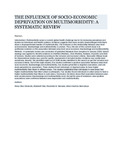Please use this identifier to cite or link to this item:
http://ir-library.mmust.ac.ke:8080/xmlui/handle/123456789/1994Full metadata record
| DC Field | Value | Language |
|---|---|---|
| dc.contributor.author | Olutende, Micky Oloo | - |
| dc.contributor.author | Mse, Elizabeth | - |
| dc.contributor.author | Wanzala, Maximilla N. | - |
| dc.contributor.author | Wamukoya, Edwin Kadima | - |
| dc.date.accessioned | 2022-01-10T09:30:17Z | - |
| dc.date.available | 2022-01-10T09:30:17Z | - |
| dc.date.issued | 2021-05 | - |
| dc.identifier.uri | http://dx.doi.org/10.46827/ejpe.v6i12.3656 | - |
| dc.identifier.uri | https://oapub.org/edu/index.php/ejep/article/view/3656 | - |
| dc.identifier.uri | http://ir-library.mmust.ac.ke:8080/xmlui/handle/123456789/1994 | - |
| dc.description.abstract | Introduction: Multimorbidity poses a current global health challenge due to its increasing prevalence and burden on individuals and health systems. Evidence suggests that more socially disadvantaged individuals share a disproportionate burden of multimorbidity. The evidence on the relationship between area-level socioeconomic disadvantage and multimorbidity is unclear. Thus, the aim of the current study is to synthesise evidence on the association between area-level socio-economic disadvantage and multimorbidity. Methods: A systematic review was conducted of published literature from inception to January 2020. Search strategy was applied to identify evidence on PubMed (Medline), Ovid (Medline, Embase, Psycinfo) and Web of Science. Studies were selected according to the inclusion and exclusion criteria. Newcastle Ottawa Scale for observational studies was used for quality assessment of included studies. Evidence was synthesised narratively. Results: We identified eight out of 2588 studies identified in the search as per the inclusion and exclusion criteria. Out of the eight studies, five studies confirmed a positive association between area-level socio-economic disadvantage and multimorbidity, two studies presented a negative association, and one study presented no association. Three studies found individuals in deprived areas to have higher multimorbidity than those in affluent areas. Two studies established that individuals in rural areas had higher multimorbidity than their urban counterparts. Two studies found individuals in urban areas to have a higher multimorbidity than those in rural areas. Conclusion: Evidence shows that association between area-level socioeconomic disadvantage and multimorbidity exist. Except for area of residence, clear positive associations were confirmed between area deprivation and multimorbidity. | en_US |
| dc.language.iso | en | en_US |
| dc.publisher | European Journal of Physical Education and Sport Science | en_US |
| dc.subject | INFLUENCE, SOCIO-ECONOMIC, DEPRIVATION, MULTIMORBIDITY SYSTEMATIC, REVIEW | en_US |
| dc.title | THE INFLUENCE OF SOCIO-ECONOMIC DEPRIVATION ON MULTIMORBIDITY: A SYSTEMATIC REVIEW | en_US |
| dc.type | Article | en_US |
| Appears in Collections: | Journal Articles | |
Files in This Item:
| File | Description | Size | Format | |
|---|---|---|---|---|
| THE INFLUENCE OF SOCIO.pdf | 285.14 kB | Adobe PDF |  View/Open |
Items in DSpace are protected by copyright, with all rights reserved, unless otherwise indicated.
